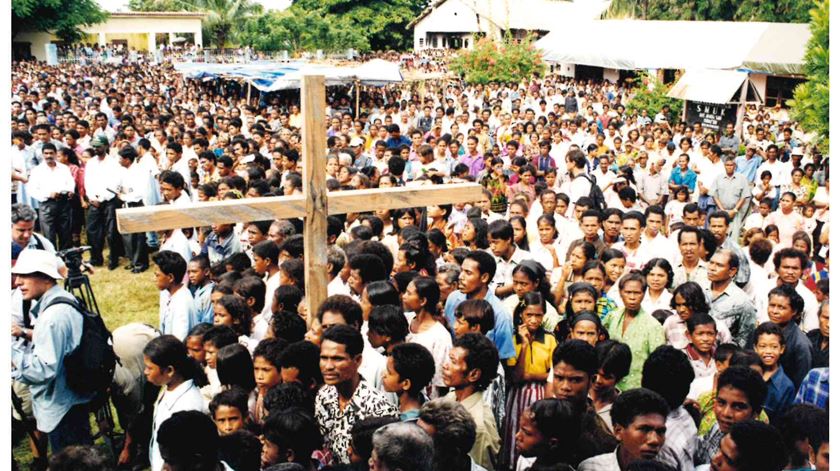The Australian Government is being accused of trying to hide part of the official history of the peacekeeping mission carried out in East Timor after the independence referendum in 1999.
The accusations, reported in the Australian press, relate to a new book that tells the official story of Australian involvement in the international peacekeeping operation in East Timor after the destruction that followed the announcement of the result of the August 30, 1999 referendum.
Official historians question that the book – “Born of Fire and Ash,” published by War Memorial – has been published without any official release (none is planned yet), unlike other volumes on Australian military history.

“Isn’t it suspicious, isn’t it strange, that there has been no official release of the book by the War Memorial, which published it?” questioned Neil James, executive director of the Australian Defence Association (ADA), quoted by news portal Crikey.
“Not only is it very, very strange, but it is also unprecedented. Every official history series since the tradition began [during World War I] has been released with much fanfare. Except for this one,” he stressed.
According to sources from the portal, the lack of official release is due to some of the content of the first volume of the official history of this period, written by Professor Craig Stockings, the official historian of the War Memorial, having been published in December.
The book “Born of Fire and Ash” was written by Stockings based on six years of research into Australia’s response to Indonesian actions before and after the referendum, which led to the entry, on September 20, 1999, of the INTERFET (International Force East Timor).
The work draws on confidential government documents and more than 2,500 interviews with veterans and officials in sectors such as defense, intelligence, and foreign affairs and details the response of the then Australian Federal Government, led by John Howard.
A source quoted by Australian news portal Crikey, knowledgeable about the research process for the book, believes the text directly contradicts the political myths surrounding Australia’s eventual peacekeeping mission in East Timor.
“The public impression of the crisis — that Australia essentially led the effort to save East Timor — is an obfuscation. The book shows that the government and its officials did their best to resist military intervention in East Timor until the end because they considered their relationship with Indonesia far more important than East Timor. That is the truth,” the source said.
Also, formerly official historian David Horner – who preceded Stockings and pushed for a book on East Timor for years – expressed surprise that there was no official launch.
“It was surprising that there was no book launch. But I understand the thinking behind it, which is that governments get extremely nervous about official stories because they think they might embarrass them or affect official relations with other countries,” he said.
Horner felt that the non-release of the book could be interpreted as an extension of the “unprecedented political interference” that underpinned attempts by Foreign Office officials to seek to modify the contents of the book during the tenure of the previous Australian Government.
Correspondence between Stockings and the MFA confirmed that the MFA was pushing to “water down the revelations in the official story,” according to Crikey, generating threats to dismiss the historian and accusations of “attempted censorship.”
The process of verifying the book’s contents took more than three years, with independent Senator Rex Patrick still pushing for the public release of more documents, something still being considered by the authorities.
The book’s preface, to which Lusa had access, recalls the difficulty in getting authorization from the Australian government to write about the period concerning East Timor, a process which involved several requests, always refused, which were approved only in 2015.
The author noted that in the research regarding East Timor, he did not feel “as free, in terms of the imposed external governance” as his predecessors, with prolonged opposition from Canberra.
“Three times this submission was presented, containing options to expand the series of peacekeeping operations to include East Timor and other operations up to 2006 or to raise a new series for Iraq and Afghanistan,” he noted.
The authorization would only come a few years after Stockings’ appointment as official historian.
“We didn’t censor ourselves. We included the good with the bad – friction and mistakes are as valid a part of the historical record as unbridled successes. Achievements, despite institutional shortcomings, tend to reinforce the legacy of those involved, not the other way around. We write as we saw things, as the evidence trail indicated. These volumes, therefore, aim to be truthful, not necessarily triumphal,” he wrote.
Stockings noted that the text is unclassified but based on “a thorough study of the classified documentary records made available by the Government for the operations covered.”
“The material excluded from the Official History Team and publication, in whole or in part, is that which the relevant Government departments and agencies consider potentially damaging to Australian national security or national interests,” he stressed.
“Some stakeholders have proved more invested than others in this regard, and the process has sometimes been difficult. However, no changes have been made that threaten the veracity, credibility, legitimacy, or integrity of the volumes,” it maintained.
With information from Sapo

